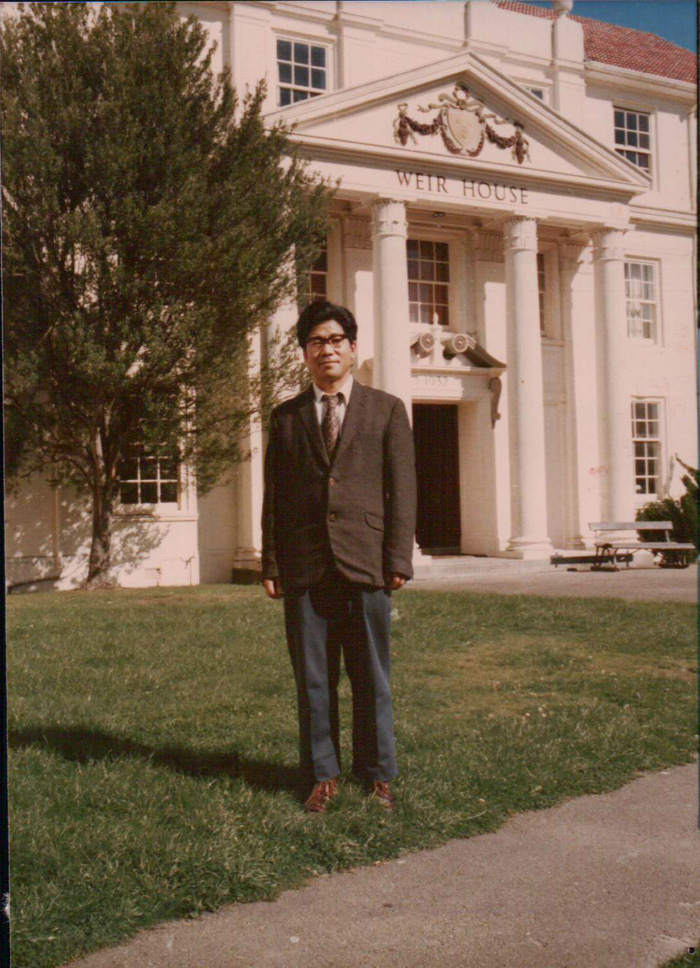
在Student dorm of the Victoria University of Willington 前, 1979年
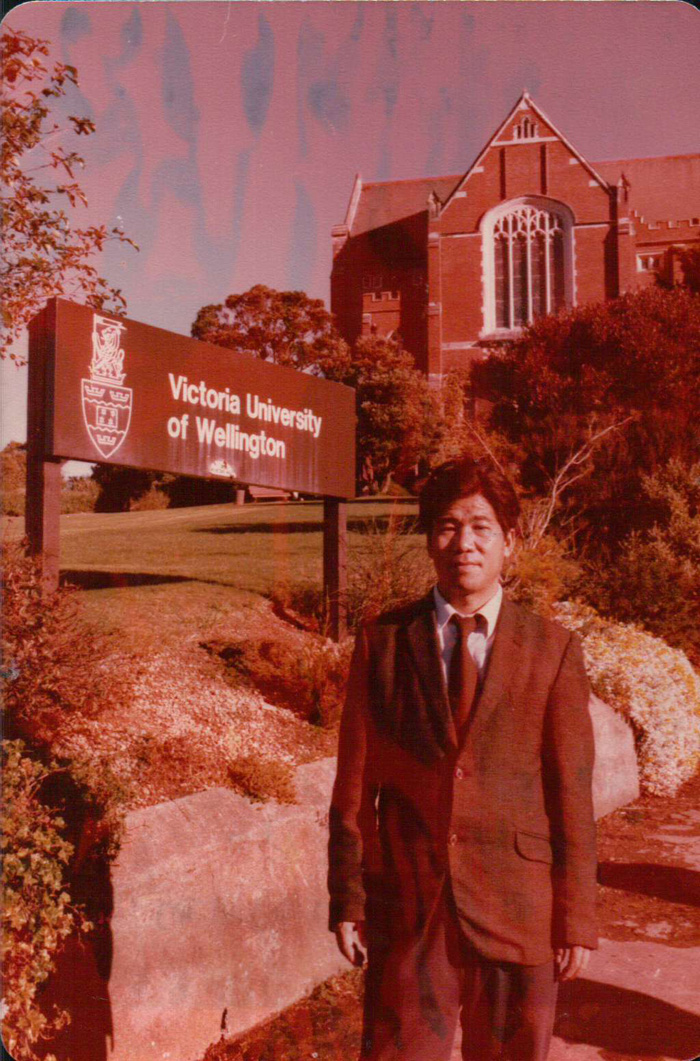
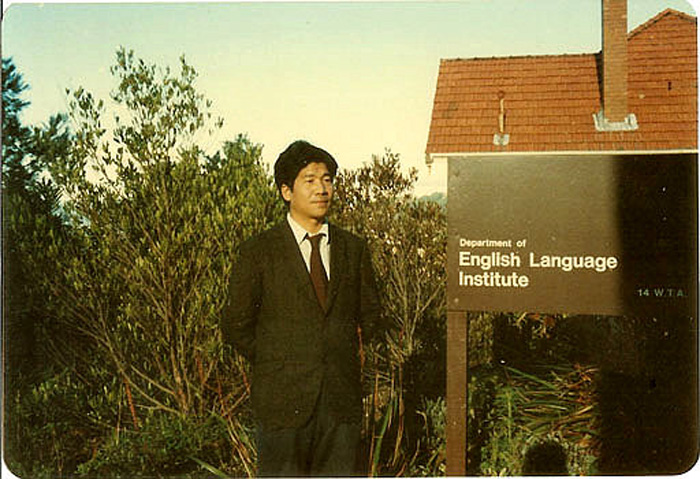
新西兰维大英语学院, 1979

1980年寒假维多利亚大学组织我们去新西兰南岛旅游
,在玻璃瓶旅馆前留影
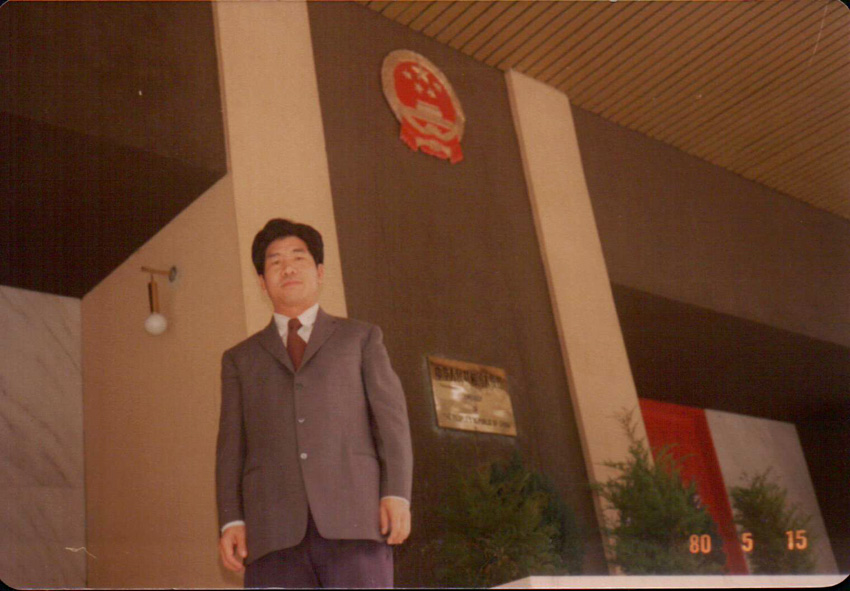
在中国驻新西兰大使馆门前, 1980年
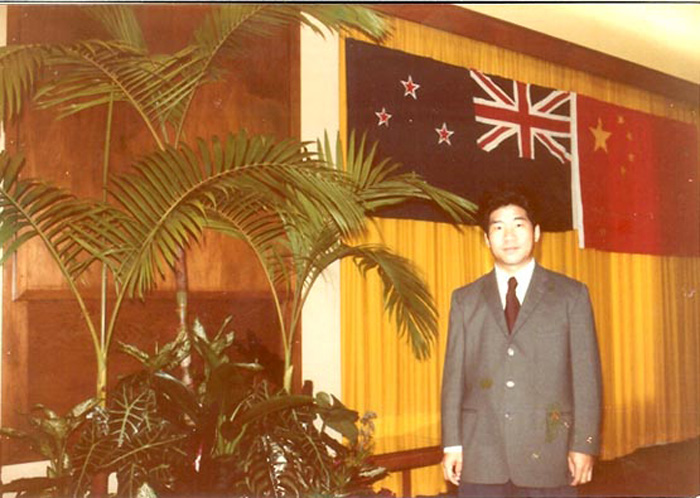
在中国驻新西兰大使馆欢迎李先念主席访问,1980年5月15
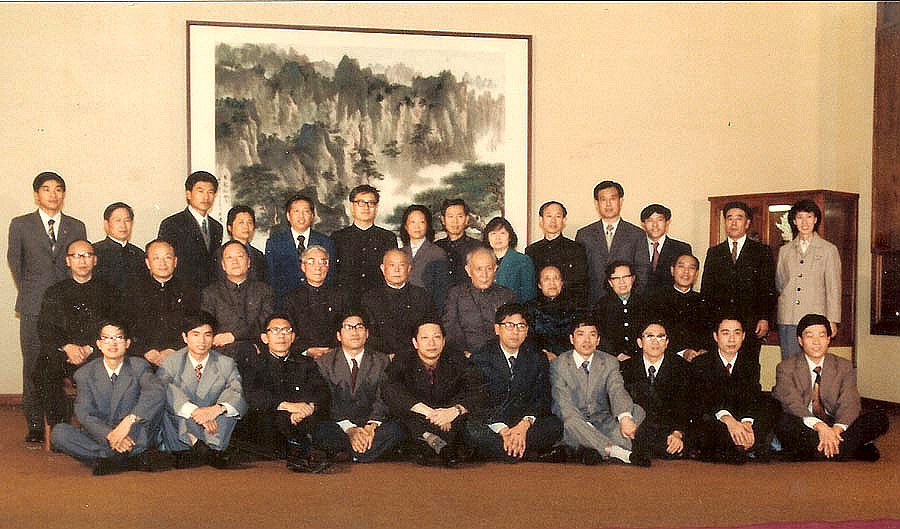
国家主席李先念访问新西兰会见使馆工作人员和留学生,前排左起第四人高东山,1980
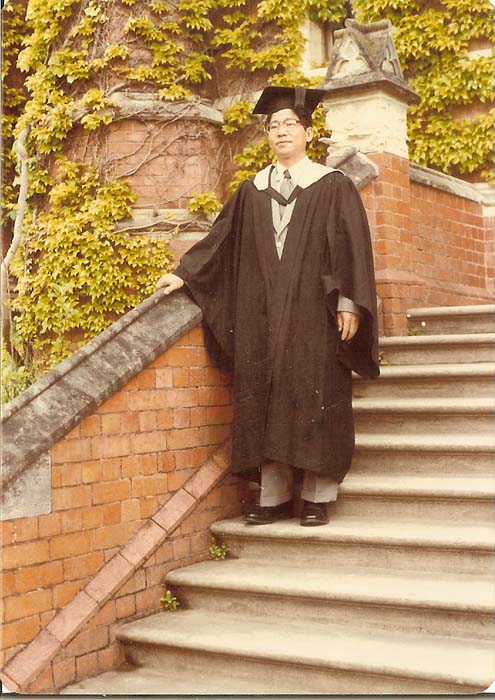
新西兰惠灵顿维多利亚大学英语系毕业后在校园留影,1981
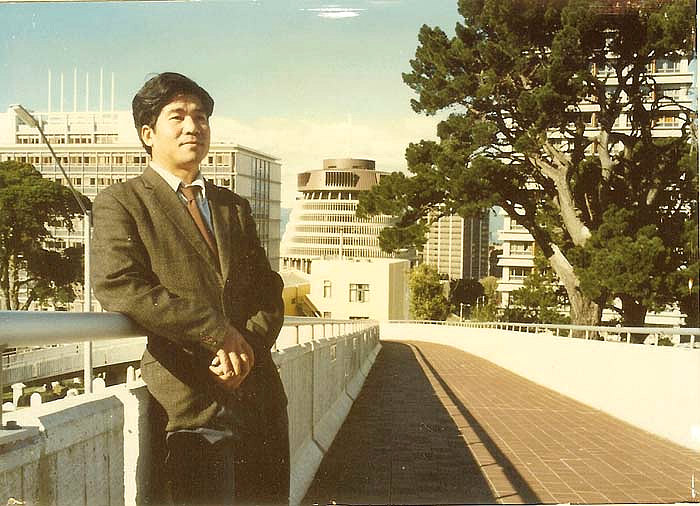
在新西兰首都惠灵顿议会大厦(The Beehive)附近留影, 1980
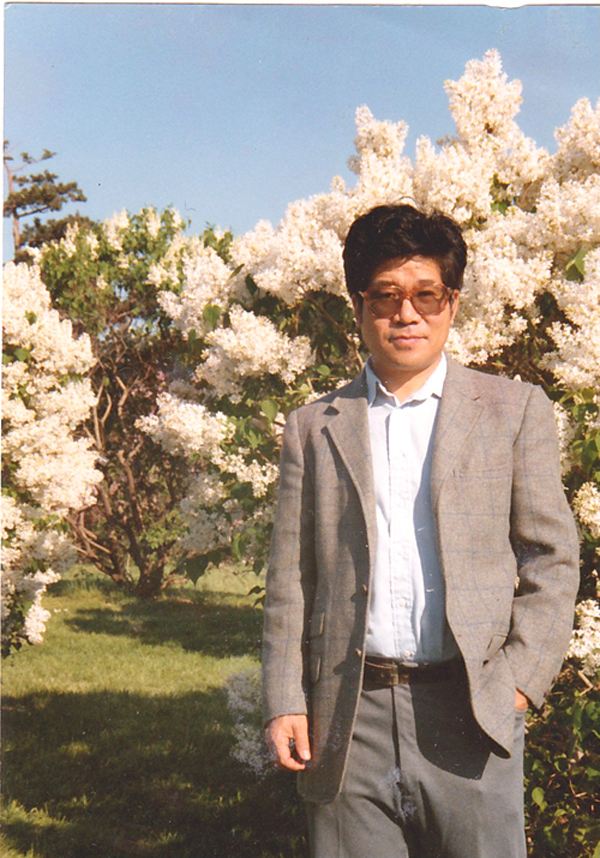
Greg in Rochester Lilac Festival, 05/1991
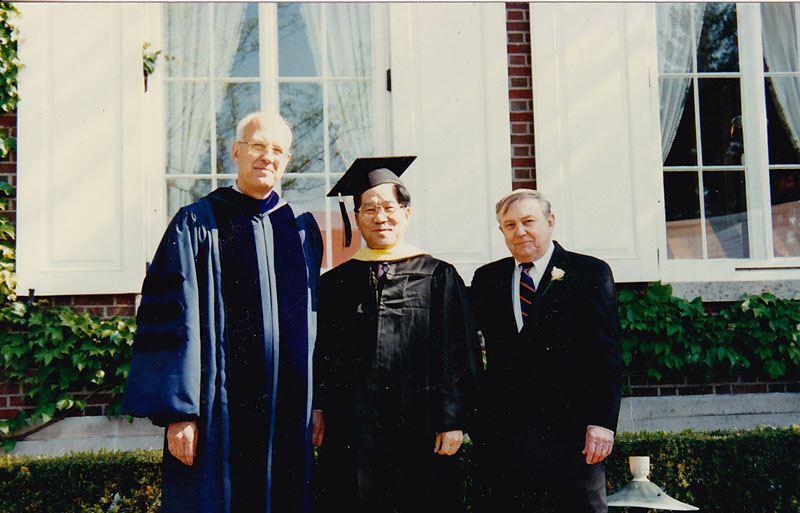
UIUC毕业典礼上与校长合影, 1996
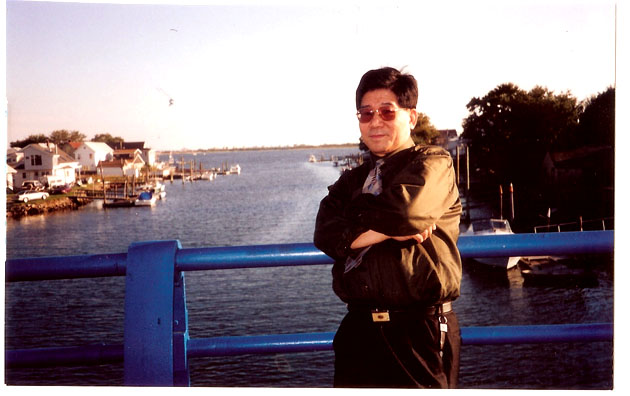
在Queens Library的分馆之一Howard Beach Community Library 附近的海边,2003年
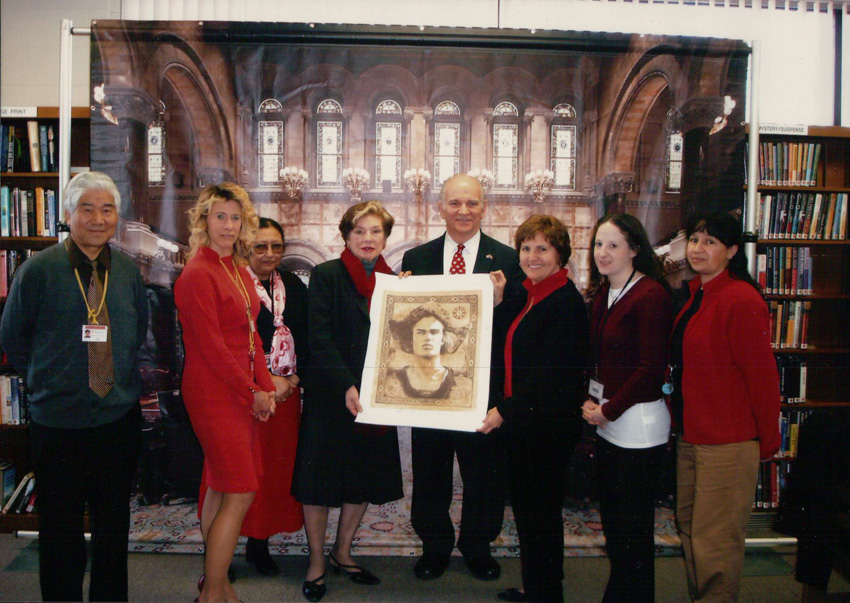
与纽约州议员Serphin Maltese(共和党)及其夫人在图书馆合影,2007
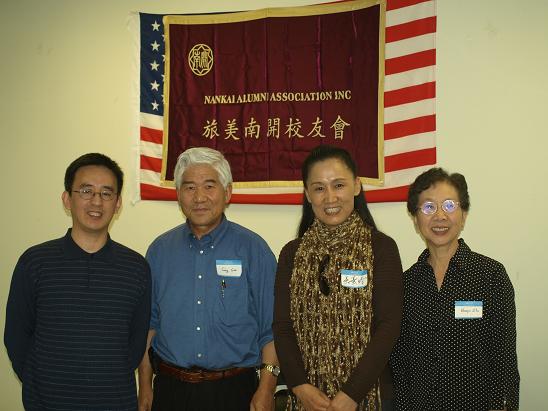
杨应时(南开外院英语系, 中央美术馆)高东山王素玲(中文系访问学者)祝宝银,10/2008 NYC 南开校友会
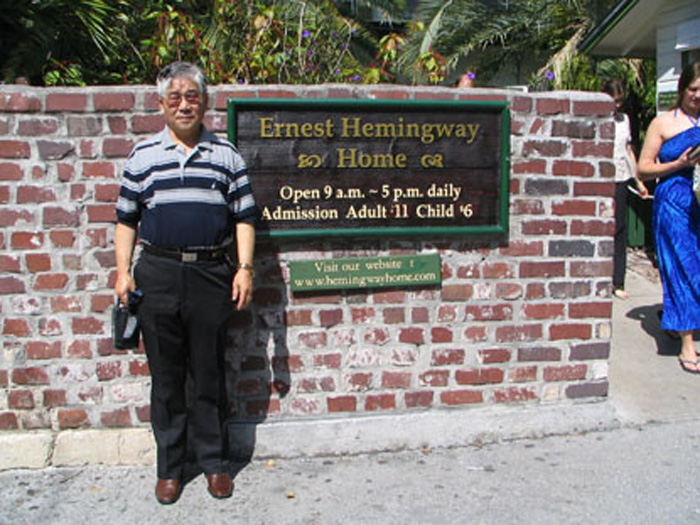
海明威故居, Key West of Florida, April 2005

With Mexican police, April 2004
President Harry Truman's Little White House in Key West of Florida, April 2004
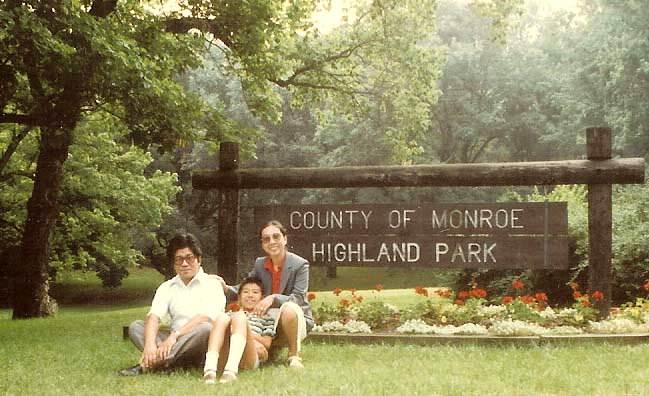
初来美国在纽约州Rochester市度过一段美好时光, 1990
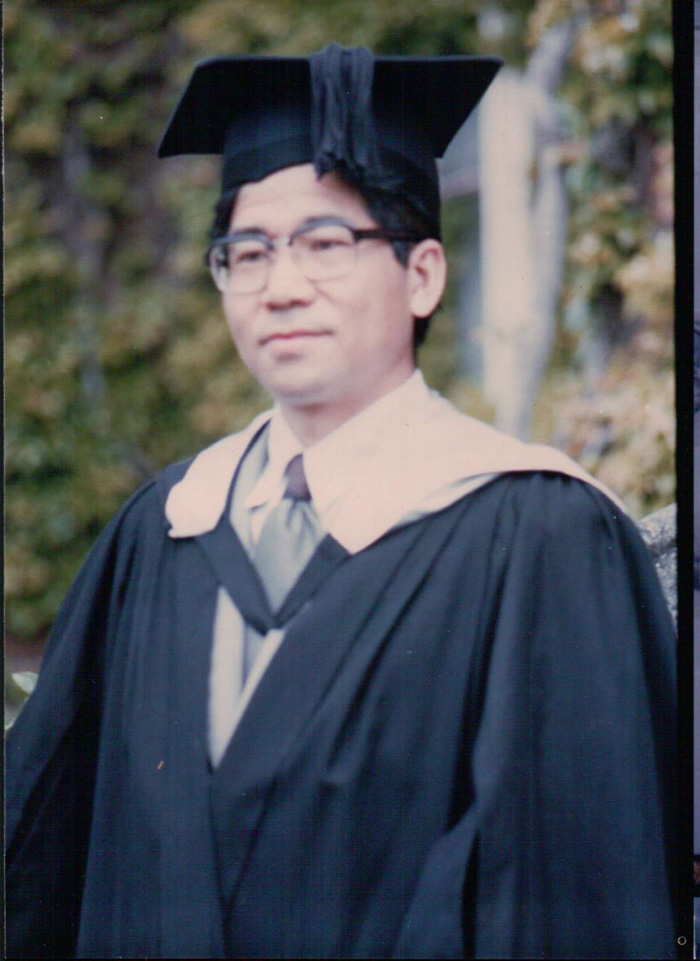
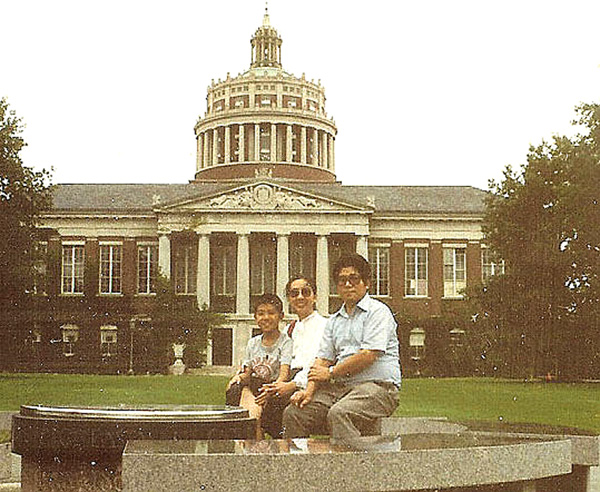
在University of Rochester Rush Rhees 图书馆前, 1989

圣诞前夕,12/24/2011,在王南家里:邹金泰高东山祝宝银蔡丽文宋芳。 当时正巧
曹其缜老师给蔡丽文打电话来,我们都分享了这个机会,向曹老师和全家祝贺节日。

两个第二代,高大铁和王南,也加入我们的行列。
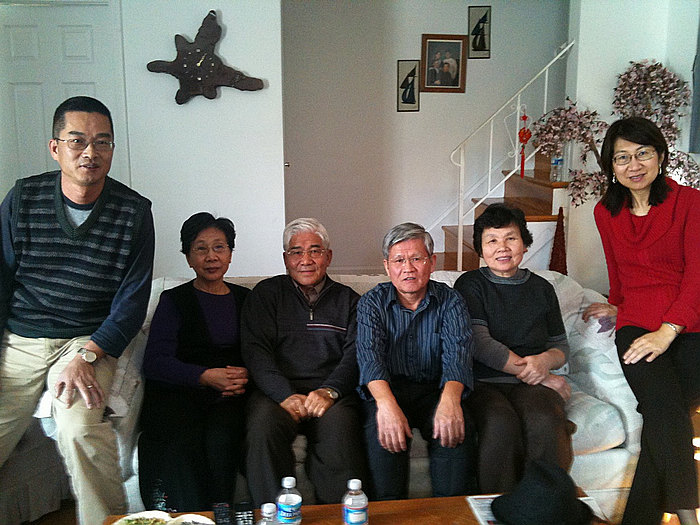
2011年12月24日,同一天上午和中午是在女儿志妹的老师南开附中校长张海洁老师
家度过的。其先生宗建超也是我们的老朋友, 他来美已经近20年,一直在John Hopkins University School of Medicine 做研究员至今。张老师在美国从事中文教育,在马里兰州巴尔的摩市“巴尔的摩中文学校”教授中文。右起志妹、张老师、宗建超、高东山、祝宝银、女婿永前。
    
|
English Poet Thomas Gray (1716-1771) |

Thomas Gray
(This work of art is in public domain.)
Thomas Gray (26 December 1716 – 30 July 1771), was an English poet, classical scholar and professor at Cambridge University. He began seriously writing poems in 1742, mainly after his close friend Richard West died. He moved to Cambridge and began a self-imposed programme of literary study, becoming one of the most learned men of his time, though he claimed to be lazy by inclination. He became a Fellow first of Peterhouse, and later of Pembroke College, Cambridge. Gray spent most of his life as a scholar in Cambridge, and only later in his life did he begin travelling again. Although he was one of the least productive poets (his collected works published during his lifetime amount to less than 1,000 lines), he is regarded as the predominant poetic figure of the mid-18th century. In 1757, he was offered the post of Poet Laureate, which he refused. In 1768, he succeeded Lawrence Brockett as Regius Professor of Modern History at Cambridge, a sinecure.
Gray was so self critical and fearful of failure that he only published 13 poems during his lifetime, and once wrote that he feared his collected works would be "mistaken for the works of a flea." Walpole said that "He never wrote anything easily but things of Humour." It is believed that Gray wrote his masterpiece, the Elegy Written in a Country Churchyard, in the graveyard of the church in Stoke Poges, Buckinghamshire in 1750. The poem was a literary sensation when published by Robert Dodsley, one of the foremost publishers of the day, in February 1751 and has made a lasting contribution to English literature. Its reflective, calm and stoic tone was greatly admired, and it was pirated, imitated, quoted and translated into Latin and Greek. It is still one of the most popular poems in the English language. This meditative poem "Elegy Written in a Country Churchyard" is also probably the most quoted poem in the English language. Gray's poetry illustrates the evolution of 18th century English poetry from Classicism to early Romanticism. Before the Battle of the Plains of Abraham (also known as the "Battle of Quebec", British General James Wolfe is said to have recited it to his officers, adding: "Gentlemen, I would rather have written that poem than take Quebec tomorrow". The poem's famous depiction of an "ivy-mantled tow'r" could be a reference to the early-mediaeval St. Laurence's Church in Upton, Slough, England.
The Elegy was recognised immediately for its beauty and skill. It contains many outstanding phrases which have entered the common English lexicon, either on their own or as referenced in other works. A few of these include: "Far from the madding crowd", "The paths of glory", "Celestial fire", "The unlettered muse", "Kindred spirit", "Some mute inglorious Milton".
Gray also wrote light verse, such as Ode on the Death of a Favourite Cat, Drowned in a Tub of Gold Fishes, a mock elegy concerning Horace Walpole's cat. Gray’s surviving letters also show his sharp observation and playful sense of humour. He is also well known for his statement that "where ignorance is bliss, 'tis folly to be wise," from his 1742 Ode on a Distant Prospect of Eton College.
  
Elegy Written in a Country Churchyard
by Thomas Gray
|
|
|
| |
The curfew tolls the knell of parting day,
The lowing herd wind slowly o'er the lea,
The plowman homeward plods his weary way,
And leaves the world to darkness and to me.
Now fades the glimmering landscape on the sight,
And all the air a solemn stillness holds,
Save where the beetle wheels his droning flight,
And drowsy tinklings lull the distant folds;
Save that from yonder ivy-mantled tow'r
The moping owl does to the moon complain
Of such as, wand'ring near her secret bow'r,
Molest her ancient solitary reign.
Beneath those rugged elms, that yew-tree's shade,
Where heaves the turf in many a mould'ring heap,
Each in his narrow cell for ever laid,
The rude Forefathers of the hamlet sleep.
The breezy call of incense-breathing Morn,
The swallow twitt'ring from the straw-built shed,
The cock's shrill clarion, or the echoing horn,
No more shall rouse them from their lowly bed.
For them no more the blazing hearth shall burn,
Or busy housewife ply her evening care:
No children run to lisp their sire's return,
Or climb his knees the envied kiss to share.
Oft did the harvest to their sickle yield,
Their furrow oft the stubborn glebe has broke:
How jocund did they drive their team afield!
How bow'd the woods beneath their sturdy stroke!
Let not Ambition mock their useful toil,
Their homely joys, and destiny obscure;
Nor Grandeur hear with a disdainful smile
The short and simple annals of the poor.
The boast of heraldry, the pomp of pow'r,
And all that beauty, all that wealth e'er gave,
Awaits alike th' inevitable hour:
The paths of glory lead but to the grave.
Nor you, ye Proud, impute to These the fault,
If Memory o'er their Tomb no Trophies raise,
Where through the long-drawn aisle and fretted vault
The pealing anthem swells the note of praise.
Can storied urn or animated bust
Back to its mansion call the fleeting breath?
Can Honour's voice provoke the silent dust,
Or Flatt'ry soothe the dull cold ear of death?
Perhaps in this neglected spot is laid
Some heart once pregnant with celestial fire;
Hands, that the rod of empire might have sway'd,
Or waked to ecstasy the living lyre.
But Knowledge to their eyes her ample page
Rich with the spoils of time did ne'er unroll;
Chill Penury repress'd their noble rage,
And froze the genial current of the soul.
Full many a gem of purest ray serene
The dark unfathom'd caves of ocean bear:
Full many a flower is born to blush unseen,
And waste its sweetness on the desert air.
Some village Hampden that with dauntless breast
The little tyrant of his fields withstood,
Some mute inglorious Milton here may rest,
Some Cromwell guiltless of his country's blood.
Th' applause of list'ning senates to command,
The threats of pain and ruin to despise,
To scatter plenty o'er a smiling land,
And read their history in a nation's eyes,
Their lot forbade: nor circumscribed alone
Their glowing virtues, but their crimes confined;
Forbade to wade through slaughter to a throne,
And shut the gates of mercy on mankind,
The struggling pangs of conscious truth to hide,
To quench the blushes of ingenuous shame,
Or heap the shrine of Luxury and Pride
With incense kindled at the Muse's flame.
Far from the madding crowd's ignoble strife,
Their sober wishes never learn'd to stray;
Along the cool sequester'd vale of life
They kept the noiseless tenor of their way.
Yet ev'n these bones from insult to protect
Some frail memorial still erected nigh,
With uncouth rhymes and shapeless sculpture deck'd,
Implores the passing tribute of a sigh.
Their name, their years, spelt by th' unletter'd muse,
The place of fame and elegy supply:
And many a holy text around she strews,
That teach the rustic moralist to die.
For who, to dumb Forgetfulness a prey,
This pleasing anxious being e'er resign'd,
Left the warm precincts of the cheerful day,
Nor cast one longing ling'ring look behind?
On some fond breast the parting soul relies,
Some pious drops the closing eye requires;
Ev'n from the tomb the voice of Nature cries,
Ev'n in our Ashes live their wonted Fires.
For thee, who, mindful of th' unhonour'd dead,
Dost in these lines their artless tale relate;
If chance, by lonely contemplation led,
Some kindred spirit shall inquire thy fate,
Haply some hoary-headed Swain may say,
'Oft have we seen him at the peep of dawn
Brushing with hasty steps the dews away
To meet the sun upon the upland lawn.
'There at the foot of yonder nodding beech
That wreathes its old fantastic roots so high,
His listless length at noontide would he stretch,
And pore upon the brook that babbles by.
'Hard by yon wood, now smiling as in scorn,
Mutt'ring his wayward fancies he would rove,
Now drooping, woeful wan, like one forlorn,
Or crazed with care, or cross'd in hopeless love.
'One morn I miss'd him on the custom'd hill,
Along the heath and near his fav'rite tree;
Another came; nor yet beside the rill,
Nor up the lawn, nor at the wood was he;
'The next with dirges due in sad array
Slow through the church-way path we saw him borne.
Approach and read (for thou canst read) the lay
Graved on the stone beneath yon aged thorn:'
THE EPITAPH
Here rests his head upon the lap of Earth
A Youth to Fortune and to Fame unknown.
Fair Science frown'd not on his humble birth,
And Melancholy mark'd him for her own.
Large was his bounty, and his soul sincere,
Heav'n did a recompense as largely send:
He gave to Mis'ry all he had, a tear,
He gain'd from Heav'n ('twas all he wish'd) a friend.
No farther seek his merits to disclose,
Or draw his frailties from their dread abode,
(There they alike in trembling hope repose,)
The bosom of his Father and his God.
|
|
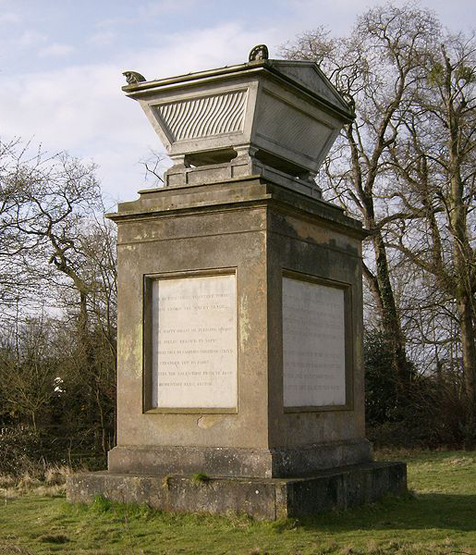
Monument inscribed with the Elegy in Stoke Poges, Buckinghamshir,England
(Permission is granted to copy, distribute and/or modify this document under the terms of the
GNU Free Documentation License, Version 1.2)

Thomas Gray
Ode on the death of a favorite cat
by Thomas Gray
|
|
|
| |
Twas on a lofty vase's side,
Where China's gayest art had dyed
The azure flowers that blow;
Demurest of the tabby kind,
The pensive Selima, reclined,
Gazed on the lake below.
Her conscious tail her joy declared;
The fair round face, the snowy beard,
The velvet of her paws,
Her coat, that with the tortoise vies,
Her ears of jet, and emerald eyes,
She saw; and purred applause.
Still had she gazed; but 'midst the tide
Two angel forms were seen to glide,
The genii of the stream:
Their scaly armor's Tyrian hue
Through richest purple to the view
Betrayed a golden gleam.
The hapless nymph with wonder saw:
A whisker first and then a claw,
With many an ardent wish,
She stretched in vain to reach the prize.
What female heart can gold despise?
What cat's averse to fish?
Presumptuous maid! with looks intent
Again she stretched, again she bent,
Nor knew the gulf between.
(Malignant Fate sat by and smiled)
The slippery verge her feet beguiled,
She tumbled headlong in.
Eight times emerging from the flood
She mewed to every watery god,
Some speedy aid to send.
No dolphin came, no Nereid stirred;
Nor cruel Tom, nor Susan heard;
A favorite has no friend!
From hence, ye beauties, undeceived,
Know, one false step is ne'er retrieved,
And be with caution bold.
Not all that tempts your wandering eyes
And heedless hearts, is lawful prize;
Nor all that glisters, gold.
|
|
Ode On The Spring
by Thomas Gray
|
|
|
| |
Lo! where the rosy-bosom'd Hours,
Fair Venus' train appear,
Disclose the long-expecting flowers,
And wake the purple year!
The Attic warbler pours her throat,
Responsive to the cuckoo's note,
The untaught harmony of spring:
While whisp'ring pleasure as they fly,
Cool zephyrs thro' the clear blue sky
Their gather'd fragrance fling.
Where'er the oak's thick branches stretch
A broader, browner shade;
Where'er the rude and moss-grown beech
O'er-canopies the glade,
Beside some water's rushy brink
With me the Muse shall sit, and think
(At ease reclin'd in rustic state)
How vain the ardour of the crowd,
How low, how little are the proud,
How indigent the great!
Still is the toiling hand of Care:
The panting herds repose:
Yet hark, how thro' the peopled air
The busy murmur glows!
The insect youth are on the wing,
Eager to taste the honied spring,
And float amid the liquid noon:
Some lightly o'er the current skim,
Some show their gaily-gilded trim
Quick-glancing to the sun.
To Contemplation's sober eye
Such is the race of man:
And they that creep, and they that fly,
Shall end where they began.
Alike the busy and the gay
But flutter thro' life's little day,
In fortune's varying colours drest:
Brush'd by the hand of rough Mischance,
Or chill'd by age, their airy dance
They leave, in dust to rest.
Methinks I hear in accents low
The sportive kind reply:
Poor moralist! and what art thou?
A solitary fly!
Thy joys no glitt'ring female meets,
No hive hast thou of hoarded sweets,
No painted plumage to display:
On hasty wings thy youth is flown;
Thy sun is set, thy spring is gone--
We frolic, while 'tis May.
|
|
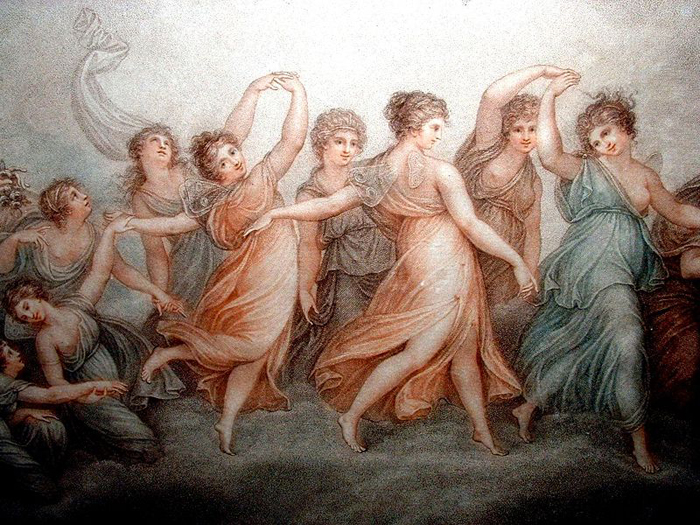
The Hours by Maria Cosway(1760-1838),
an illustration to Gray's poem Ode on the Spring, referring to the first two lines of the poem
"Lo! where the rosy-bosomed Hours, / Fair Venus' train, appear."
(This work of art is in the public domain.)
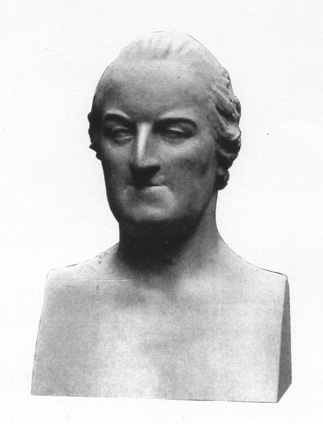
Thomas Gray's Bust in terra cotta by John Bacon (1740-1799)
(This work of art is in the public domain.)
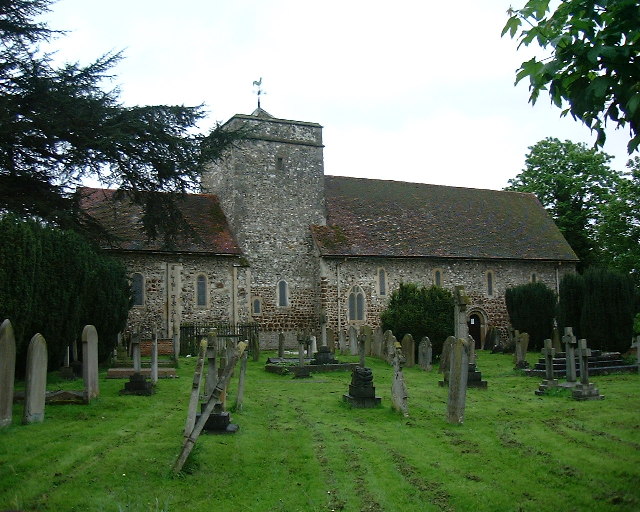
The Elegy's famous depiction of an "ivy-mantled tow'r" could be a reference to the
early-mediaeval St. Laurence's Church in Upton, Slough, England。
(Permission is granted to copy, distribute and/or modify this document under the terms of the
GNU Free Documentation License, Version 1.2)
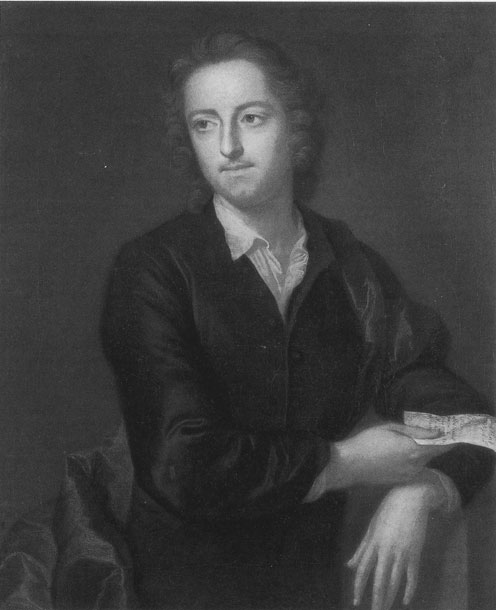
Thomas Gray as sitter in 1747 holding the MS of the Ode on a Distant Prospect of Eton College
(This work of art is in the public domain.)
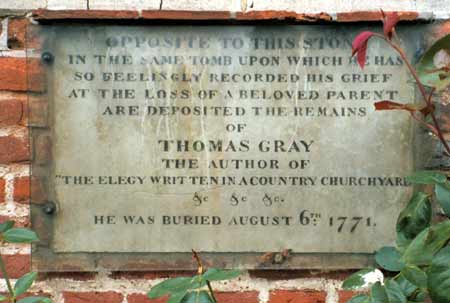
Tomb of Thomas Gray in Stoke Poges Churchyard。
It is believed that Gray wrote his masterpiece, the Elegy Written in a Country Churchyard, in the graveyard of the church in Stoke Poges, Buckinghamshire in 1750
(The work has been released into the public domain by the copyright holder.)
 
|
01/20/2009
 刚刚离任的布什总统 参加完奥巴马的就职典礼后,回到德州时对迎接他的人群说,“(执政时)受欢迎程度不过是过眼云烟,只有性格和良知才是我们永远拥有的东西。” 美国“外交政策杂志”(Foreign Policy)说,美国历史上两个最大的外交错误第一是越南战争,第二是小布什发动的伊拉克战争。 刚刚离任的布什总统 参加完奥巴马的就职典礼后,回到德州时对迎接他的人群说,“(执政时)受欢迎程度不过是过眼云烟,只有性格和良知才是我们永远拥有的东西。” 美国“外交政策杂志”(Foreign Policy)说,美国历史上两个最大的外交错误第一是越南战争,第二是小布什发动的伊拉克战争。
|

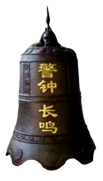


 南开校友及各界朋友信息交流网站
南开校友及各界朋友信息交流网站